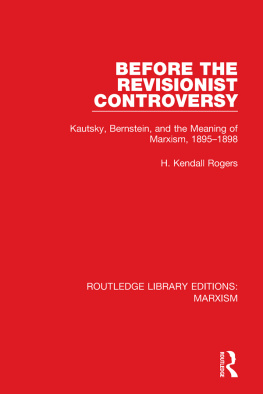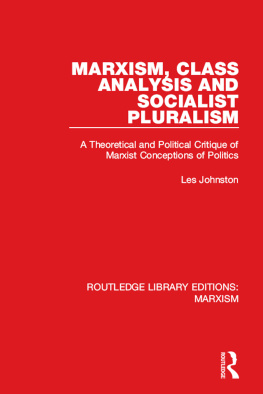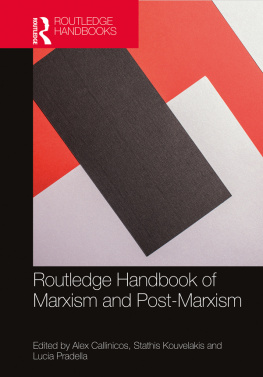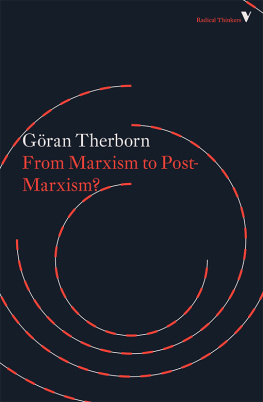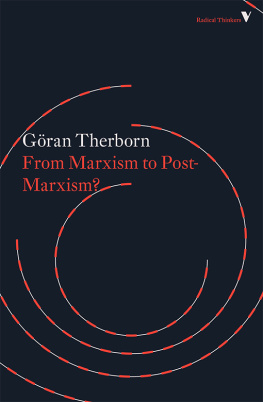ROUTLEDGE LIBRARY EDITIONS:
MARXISM
Volume 1
BEFORE THE REVISIONIST
CONTROVERSY
BEFORE THE REVISIONIST
CONTROVERSY
Kautsky, Bernstein, and the Meaning of
Marxism, 18951898
H. KENDALL ROGERS
First published in 1992
This edition first published in 2015
by Routledge
2 Park Square, Milton Park, Abingdon, Oxon OX14 4RN
and by Routledge
711 Third Avenue, New York, NY 10017
Routledge is an imprint of the Taylor & Francis Group, an informa business
1992 H. Kendall Rogers
All rights reserved. No part of this book may be reprinted or reproduced or utilised in any form or by any electronic, mechanical, or other means, now known or hereafter invented, including photocopying and recording, or in any information storage or retrieval system, without permission in writing from the publishers.
Trademark notice: Product or corporate names may be trademarks or registered trademarks, and are used only for identification and explanation without intent to infringe.
British Library Cataloguing in Publication Data
A catalogue record for this book is available from the British Library
ISBN: 978-1-138-85502-1 (Set)
ISBN: 978-1-315-71284-0 (Set) (ebk)
ISBN: 978-1-138-89098-5 (Volume 1) (hbk)
ISBN: 978-1-315-70832-4 (Volume 1) (ebk)
Publishers Note
The publisher has gone to great lengths to ensure the quality of this reprint but points out that some imperfections in the original copies may be apparent.
Disclaimer
The publisher has made every effort to trace copyright holders and would welcome correspondence from those they have been unable to trace.
Before the
Revisionist Controversy
Kautsky, Bernstein,
and the Meaning of Marxism,
18951898
H. Kendall Rogers
Copyright 1992 by H. Hendall Rogers
All Rights Reserved
Library of Congress Cataloging-in-Publication Data
Rogers, Homer Hendall.
Before the revisionist controversy: Hautsky, Bernstein, and the meaning of Marxism, 18951898 / H. Hendall flogers.
p. cm. [Modern European history]
Revision of thesis [Ph. D.]Harvard University, 1984.
Includes bibliographical references [p. ] and index.
ISBN 0-8153-0674-1 [alk. paper]
1. CommunismHistory19th century. 2. SocialismHistory19th century. 3. Hautsky, Harl, 18541938. 4. Bernstein, Eduard, 18501932. I. Title. II. Series.
HX39.858 1992
335.423dc20 92-29718
CIP
Designed by Marisel Tavrez
Printed on acid-free, 250-year-life paper.
Manufactured in the United States of America
Contents
(1992)
My dissertation eight years ago was unusual because of its focus on both Karl Kautsky and Eduard Bernstein, its concentration on a relatively short period of time (mid-1895 to early 1898), and its extended consideration of the role played by key opponents (particularly Wilhelm Liebknecht, H. M. Hyndman, and Ernest Belfort-Bax) in shaping the thought of Kautsky and Bernstein. The present text differs from the original dissertation in several respects. Among other changes, from the original I deleted some material. I embodied a few additional primary sources. I surveyed recent secondary literature and drew upon it in some instances. However, I have not gone back to re-immerse myself in the primary and secondary sources to the extent I should have liked. That would have meant writing a new book, not publishing the earlier one.
In looking back over eight years, I realize how much the context of my work has changed. The dissertation was written during one high point in the Cold War; now Communism has collapsed in Eastern Europe. Further consideration of the secondary literature and conversations with scholars in Europe and America have provided valuable insights and presented alternative viewpoints, which in turn have raised questions for me. For a new book on this topic I would want to explore especially the following areas:
1. In the mid-1890s Kautsky and Bernstein agreed in their opposition to Liebknecht, Hyndman, and Bax. But did Kautsky and Bernstein so thoroughly agree on the socialist theory they defended? For example, did Kautsky remain closer to August Bebels expectation of an imminent collapse than Bernstein did?
2. Who held the ideas which Kautsky and Bernstein rejected? In many cases they named their opponent. But in other instances they criticized ideas which appear to have been widespread among social democrats at the time, more widespread than I once realized.
3. Kautsky and Bernstein wanted a democratic state, but how liberal was Kautsky in the 1890s? For instance, what checks and balances would he have allowed to limit the power of a proletarian government in a democratic republic? Perhaps while considering the differences of Kautsky and Bernsteins thought from later Communism, on the one hand, I have failed sufficiently to note differences between them and Victorian English liberalism, on the other.
4. Kautsky and Bernstein sought a democratic republic in Germany both as the form of government under which the proletariat could gather strength and the form of government with which the proletariat would rule. But how similar would this democratic republic be to existing bourgeois republics? And what characteristics did they imagine distinguishing the Dictatorship of the Proletariat from the democratic republic?
5. What precisely were the differences among Kautsky, Bernstein, and Rosa Luxemburg on the national question and on colonialism in the mid-1890s?
In both the original dissertation and in this shortened version, I have sought to describe the opinions of Karl Kautsky and Eduard Bernstein of nearly a century ago. While seeking to do this as best I could, I have not attempted to verify whether their views were accurate--that is, whether their claims fit the factual reality of the day. Nor, for the most part, could I pursue the question of whether they correctly understood Marx, Engels, Liebknecht, Hyndman, or other socialists. To have answered this question would have required my studying the writings of these teachers, opponents, or contemporaries of Kautsky and Bernstein as much as I studied the work of the latter two. I have not done so. Scholars have debated whether Kautsky correctly understood Engels, or for that matter, whether Engels correctly interpreted Marx.
The original dissertation and this new version would have been impossible without the help of many librarians and archivists. I wish to thank the Warden and Fellows of Nuffield College, Oxford, for permission to consult the Fabian Society Papers there, the International Institute of Social History for permission to quote archival material, and especially the staff of the International Institute of Social History for their cooperation and assistance. I have benefited from the research of numerous scholars. But the mistakes are my own. While I suspect that my book contains errors, I also believe that it has some useful observations. I hope that those reading this text will do so critically, seeing it as one more contribution in a continuing dialog.
For the most part, work on the dissertation occurred in the years 1977 to 1983. My research and writing could not be full-time, since I left graduate school to begin college teaching in early 1979, and the most recent secondary sources which I consulted were published in the early 1980s. Books and articles since then show that scholarly interest in Karl Kautsky and Eduard Bernstein has remained strong.

